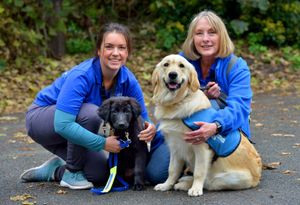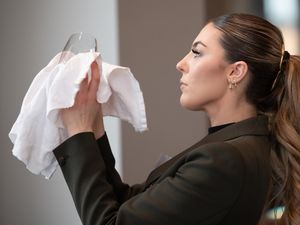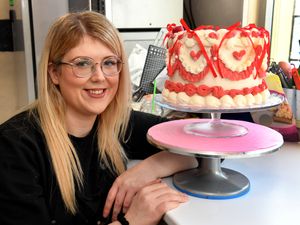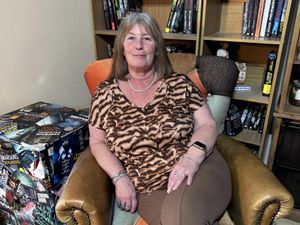Puppy love - meet the future Guide Dogs being trained in the Midlands
Jess Jarvis has helped hundreds of puppies begin their journey to becoming life-changing guide dogs.

She is a puppy training supervisor at charity Guide Dogs which helps people living with sight loss to keep their independence and confidence.
At any one time, Jess is responsible for between 35 and 40 puppies, including many across Shropshire, Staffordshire and the Black Country.
“No two days are ever the same and no two puppies are ever the same,” says Jess, who is based in Shrewsbury.
Every dog starts their journey at the charity’s National Breeding Centre, located just outside Leamington Spa, where there’s capacity to breed up to 1,500 puppies a year. “The puppies are born in a volunteer’s home where mum and puppies are looked after for six weeks.
“They then spend a week at our National Breeding Centre getting health checks and a microchip and from there go to our volunteer puppy walkers, who are responsible for their early training,” explains Jess.
Puppy walkers introduce the young dogs to new experiences which might include public transport, shops, cafes and busy roads as well as different sights, smells and sounds.
They also are taught to walk ahead on the lead and obey simple commands such as sit, down, stay and come and they also attend classes to learn how to behave properly around other people and dogs.
The classes also give puppy walkers the chance to socialise and share their stories and experiences. And dog lover Jess who has a five-year-old Border Collie named Jim, is on hand to support them every step of the way.
“I always knew I wanted to work with animals but I didn’t know this was a job until I joined Guide Dogs in a different role,” she says. “Puppy training supervisor really appealed to me – I mean why wouldn’t it?
“It was the balance of interacting with dogs and also interacting with amazingly dedicated people,” adds the 28-year-old.
Her job includes carrying out home visits to monitor the progress of her charges and offer guidance to puppy walkers. “We want puppies to be confident, out-going and be happy and relaxed in all environments like travelling on public transport. “They also need to be able to adapt to change and be comfortable in new places and with new people,” says Jess.
Young dogs will stay with the puppy walkers until they are around 12-to-14 months old when they begin 16 weeks of basic training.
Puppy walkers Susie Bell and her husband Peter, from Leebotwood, are currently looking after their third puppy – seven-month-old golden retriever Parsnip.
“Parsnip is a really lovely puppy, a real gentleman. He’s just reached seven months, so he’s grown into a teenager,” says Susie, who has also been looking after 12-week-old German shepherd/golden retriever cross Nia.
“Parsnip is really intelligent and is sensitive to other dogs so he has looked after Nia and been a good big brother,” she adds.
Susie first decided to become a puppy walker after meeting a trainee guide dog at the doctor’s surgery.
“I was picking up a prescription for my husband and there was a black Labrador retriever cross – I looked straight at him and fell in love.
“He was a Guide Dog puppy – I had never seen one before. I spoke to the lady with him who told me about puppy walking and I knew it wanted to do it,” she explains.
It proved to be one of the best decisions Susie had ever made. “I can’t imagine not doing it now. It’s been the most ridiculous satisfying experience, apart from raising our children. We do miss them when they’ve gone and we do talk about our previous puppies. It is sad when they go but it doesn’t feel like a loss. We’re always kept informed by Guide Dogs about how the puppy is getting on with their training,” she tells Weekend.
Once the canine recruits have finished their basic training, next up is secondary school for their advanced training where mobility instructors help them to apply their guiding skills to everyday situations.
Once they are matched the owner and guide dog will then train together for another four weeks.
Jess says puppy walkers play a pivotal role in raising and socialising puppies to become guide dogs. “It’s a lifestyle choice because you need to be able to put 100 per cent into the development of the pup.
“It’s very time-consuming, especially at the start because of feeding and getting them house trained.
“A lot of puppies find it difficult just to do nothing. When they are very young they cannot be left on their own for extended periods of time. The majority of our puppy walkers are retired or work at home.
“At the start you’re very much fitting your lifestyle around the puppy’s needs. They may be born with the hope that they become guide dogs but they are very much normal puppies – they still go out and dig the garden or get over-excited when your friends come round to visit,” says Jess.
There are currently around 70 puppy walkers and boarders in her patche. Many on the books have helped to raise more than one with some having cared for in excess of 20 over the years.
Jess says although puppy walkers may feel sad when their time together has come to an end and a dog leaves for training, it helps them to look at the bigger picture.
“They get to see that dog go off to training and matched with an owner. I always think that for puppy walkers knowing that the dog is going to hopefully change somebody’s life overrides the heartbreak.
“It still gives me when I hear that puppies I’ve worked with have qualified as guide dogs,” she adds.
*Guide Dogs is always looking to recruit more puppy walkers. To find out more about the scheme and what it involves see www.guidedogs.org.uk/how-you-can-help/volunteering-for-guide-dogs/volunteer-role-descriptions/puppy-walker





